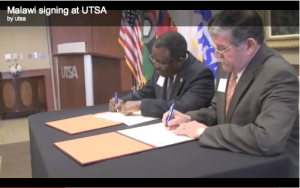By Lorna Stafford
Communications Coordinator, Office of University Communications
Building Malawi one child at a time — that is how Steve Matenje, ambassador from the Embassy of the Republic of Malawi, describes UTSA’s latest global expansion.
On April 1, UTSA President Ricardo Romo and Matenje signed an agreement of cooperation, which now gives UTSA an established presence on every continent. The agreement expands the successful Read Malawi project established in 2009 under the guidance of Misty Sailors, UTSA associate professor of interdisciplinary learning and teaching.
In addition to expanding the Read Malawi program, the formal agreement (a first between UTSA and Africa) consists of four key areas:
- Development of education programs for Malawi grade-school teachers,
- Collaborative projects involving support for small businesses and expansion of micro-enterprise projects.
- Collaborative projects that assist the expansion of Malawi ecotourism and
- Possible projects in the fields of computer science, engineering and medicine.
“This is by far an important moment not only for UTSA but for the entire San Antonio community,” said Sailors. “Not just UTSA but our city will be known in Malawi as a place where research, scholarship and humanitarian efforts converge. I am looking forward to the great programs and projects that will develop as a result of this collaboration.”
Malawi, known as the “Warm Heart of Africa” for its diplomatic relations, has a population of more than 13 million. Its chief industries are agriculture and manufacturing, although it is increasingly becoming known for its tourism.
But according to Matenje, much of the country’s progress over the last seven years has been hampered by high illiteracy rates. That’s why Read Malawi and UTSA’s extended relationship is important, he noted.
Already, the three-year, $13 million Read Malawi project sponsored by the United States Agency for International Development (USAID) are providing five million books and 182 titles to children and teachers in the republic in an effort to encourage improvements in literacy rates and provide improvements in teacher training and practice.
“Given today’s knowledge based economies, the importance of eliminating illiteracy in Malawi and poverty in all dimensions through a quality education and access to information cannot be overemphasized,” Matenje said. “I have no doubt that Read Malawi will make a difference in the lives of our school children and teachers.




